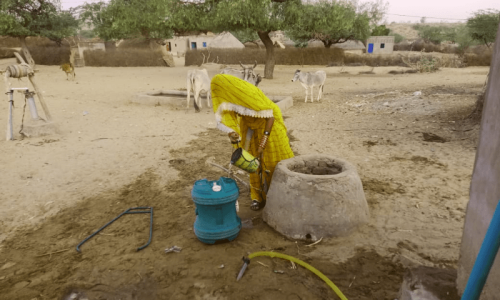KARACHI: Not many art lovers realise the importance of the strong interconnectedness between all disciplines of social sciences and liberal arts. It’s not that hard to understand: all forms of expression and subjects defining those forms have basically to do with life and the myriads of stories that it embodies. This, in turn, means that it’s all about the art of storytelling, thereby enabling us to see beyond ourselves.
Paul Mehdi Rizvi is not just a top-notch artist of the country; he is well-versed in philosophy, literature and psychology. Strike up even a brief conversation with him and you’ll know his art comes from a place which is a mix of experience, observation and knowledge. An exhibition of his latest body of work titled Illinx, which is under way at the Art Chowk Gallery, is a testimony to the claim.
First up, the presentation: there are pieces that are not conventionally hung on the gallery’s walls. You need to get down a bit to look at them closely. The artist wants you to have a perception, then disrupt it and re-absorb his exhibits. It’s an interesting way of looking at art.
Rizvi, however, doesn’t want the viewer to lose sight of what (and how) he’s trying to convey. There’s a delectable variety of subjects on display ranging from satirical notes on society to serious thinking about the way human beings function. This is perhaps the reason that he has employed a good number of media (inkjet pigment prints, found prints, steel, wood, lint, etc) to put his approach to art, if not message, across. The result is a feast for the eyes and food for the soul.
Two examples must be given here: ‘In praise of subtle imperfections’ and ‘Dr Freud’s office’. To get the hang of them, the following part of the artist’s statement might help: “I am not a strong believer in the notion that art can be presented and received with ‘freedom of intent and interpretation’ because from within the sociology of art, I am aware of the structural frameworks surrounding the activity of producing art, and collaterally it’s consumption as culture. We also know from Barthes, Marcuse et al that art ‘signals’ at many levels, but the layers one then investigates make up a continuum; with this last statement I do not refer to contextualisation or a ‘ melting of all things solid, into air.’”
Rizvi, in a roundabout way, is touching on the existentialist notion of ‘man is condemned to be free’. Even if there’s some other drift to his artworks, the creative abandon with which he’s made them is quite special.
The exhibition concludes on June 3.
Published in Dawn, June 3rd, 2021















































Dear visitor, the comments section is undergoing an overhaul and will return soon.